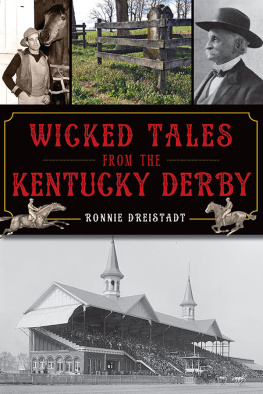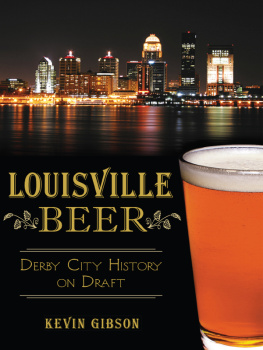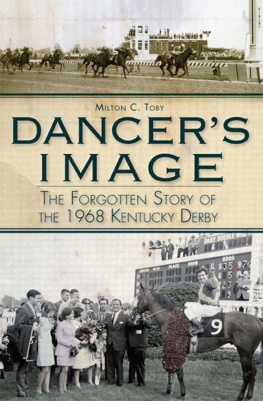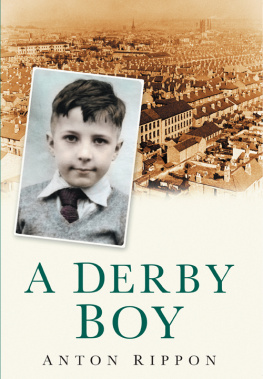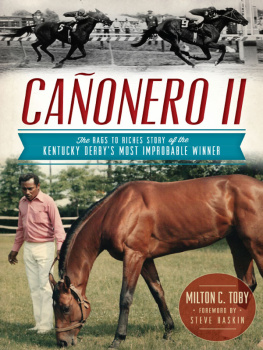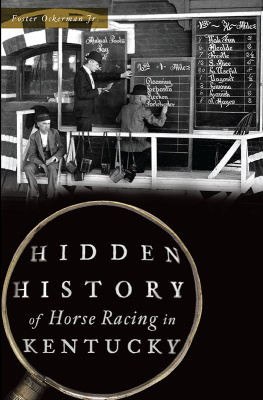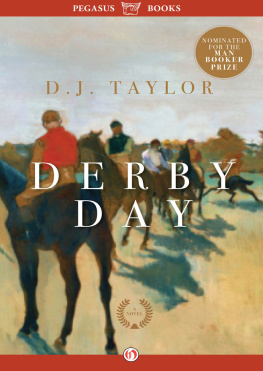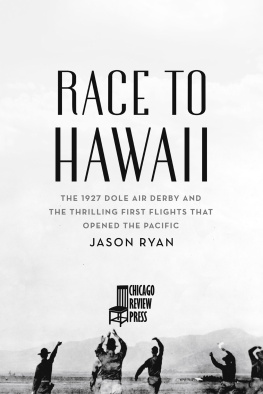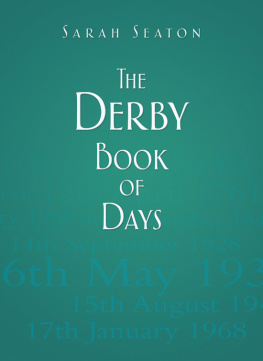
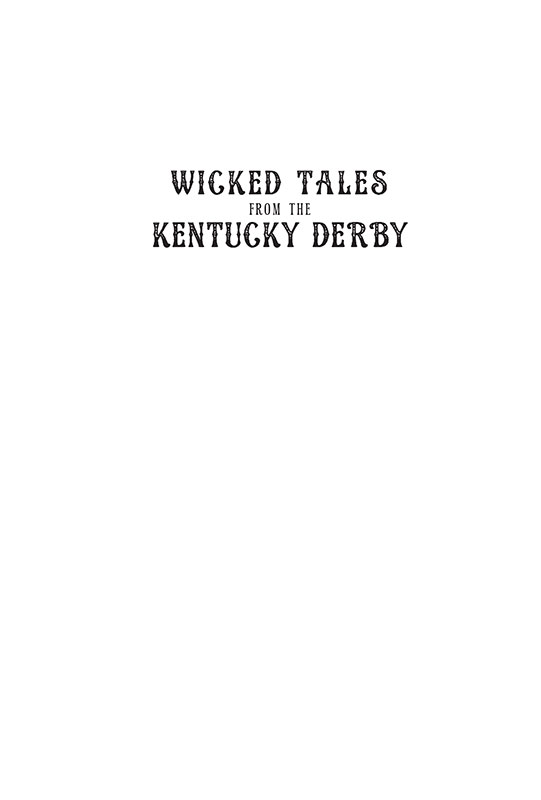

Published by The History Press
Charleston, SC
www.historypress.com
Copyright 2022 by Ronnie Dreistadt
All rights reserved
First published 2022
E-Book edition 2022
ISBN 978.1.43967.455.0
Library of Congress Control Number: 2021950582
Print Edition ISBN 978.1.46715.123.8
Notice: The information in this book is true and complete to the best of our knowledge. It is offered without guarantee on the part of the author or The History Press. The author and The History Press disclaim all liability in connection with the use of this book.
All rights reserved. No part of this book may be reproduced or transmitted in any form whatsoever without prior written permission from the publisher except in the case of brief quotations embodied in critical articles and reviews.
CONTENTS
For Meichele, Jacqueline, Caleb and Mary Kateand all the Evelyns.
Its not the horses alone running at Churchill Downs. Tradition, by-gone romance,
dimmed, echoing poetry, the ghosts of ancient gloriestheyre all therespeeding
down the homestretch and past the grandstand, and on into the sunsets gilded
afterglow of vanished yesterdays.
Irvin Cobb
The Kentucky Derby, whatever it isa race, an emotion, a turbulence, an
explosionis one of the most beautiful and violent and satisfying things I have
ever experienced.
John Steinbeck
PREFACE
During the troubled times of the Great Depression, there was a racehorse trainer named Hank who dreamed of winning the big onethe big one, of course, being the Kentucky Derby. He struggled, however, enticing wealthy horse owners to trust him with horses of that caliber. Although he was well respected as a horseman, owners sent their valuable equine athletes to the most esteemed trainers of that daySunny Jim Fitzimmons, James Rowe Jr. and the like. So, Hank did what he could, knocking around the Midwest with a small stable of cheap racehorses, barely eking out a living and sometimes relying on soup kitchens and charity to keep his head above water. He was reserved and surly with a determined intensity to make it in the cutthroat business of racing horses. His grizzled appearance, usually with a shoddy old red cap, was a fixture in racetrack stables as he quietly went about his work.
Then a miracle happeneda miracle in the form of a seventeen-hands-tall, 1,100-pound running machine named Phalanx. Phalanx, a regally bred youngster born on one of the most prestigious central Kentucky breeding farms, had the blood of champions circulating through his veins. From an early age, his athletic talent and striking figure turned heads. People in the know whispered that they hadnt seen that much raw talent since the great Man O War. But in the care of one high profile trainerand then anotherit became evident that Phalanx was uncontrollable. He wouldnt train. He allowed a rider on his back only at his own discretion or whim, which was rare. In the eyes of his owner, a Chicago businessman who was also feeling the effects of Americas greatest economic turbulence, the horse was a waste of talent. The frustrated owner looked to sell the horse at least as a prized stud, so gelding (or castrating) the horse was out of the question. With no breeders willing to take a chance on the unproven colt, the unhappy owner instead turned the training duties over to Hank. Maybe a different approach was needed, and Hank commanded only a nominal training fee.
You know how this story is going to go. Its nearly every racehorse book or movie formula: Hank worked patiently with the animal, attending to his every need. He couldnt afford barn help, so it was his job to feed, groom, hot walk and exercise the colt. Almost immediately, a great change came over the horse. Phalanx began to focus and do as he was asked. In his first published morning time trial, Phalanx, with Hank on his back trying to hold the exuberant horse in check, breezed a half mile in a tick under forty-six secondsa magnificent display of speed. A week later, Hank let Phalanx have more rein, and the giant Thoroughbred wiped another second off the stopwatch.
In his twenty-four years of training, Hank had never worked with a horse with this much ability, and he dared to dream the unthinkablewinning the greatest race in the world, the Kentucky Derby. All the sacrifices he made dedicating his life to the horsessleeping in stalls and boxcars, losing touch with what little family he had left, the aches and pains of being stepped on and bit, the gnawing and underlying feeling of failurewould be worth it and more if he could get his magnificent horse to the finish line first on the first Saturday in May.
Phalanx ran his first race in the spring of his two-year-old year in Lexington and finished third. Hank was unperturbed as Phalanx made up ground near the end and was full of run as the jockey pulled him up. Hank knew his horses better days lay ahead, when the races got longer and Phalanx could wear down his competitors with his ground-swallowing stride. A week later, also in Lexington, Phalanx improved, closing ground with a rush, only losing by a scant nose to another well-regarded juvenile. Gamblers made Phalanx a strong favorite in his next start, and the horse galloped home to an easy winner. For Hank, the win could not come a moment too soon, as he used the purse winnings to pay his feed man, an account that was three weeks in arrears. Hank ran the horse four more times over the summer, winning three races convincingly before giving Phalanx a short break. Hank brought Phalanx back in September, winning consecutive stakes races in St. Louis before deciding to give his horse one more race before winter. It was in St. Louis that Hank treated himself to his very first steak dinner, which he ate by himself in a dingy, greasy diner. He savored every bite of his $1.25 steak dinner and somewhat fancied himself a success.
This last race was the prestigious Iroquois Stakes, which is held in early November at Churchill Downs. The race was a contest for the top two-year-old Thoroughbreds with an eye toward the Kentucky Derby starting gate six months later. If Phalanx won, Hank believed his horse would be stamped as the winter book favorite to win the roses. Training up to the Iroquois, however, proved to be a challenge. Phalanx ran a fever in the early part of October, interrupting Hanks training plan. Then, after just a week back, a minor hoof injury further delayed training. With only a few days left before the race, Hank felt his high-strung animal needed a final tune up to be at his best. Always a quiet, taciturn man, Hank dedicated every thought to what he believed was his gateway to something better. He felt that after a good, fast workout, his horse would be ready for a big effort.
On the morning of the scheduled workout, Hank woke to heavy fog engulfing the Churchill Downs Racetrack. The early November morning was especially cool and raw, a cold biting mist greeting man and beast. In his barn, Hank tacked up his horse, disregarding the ominous weather. In his years of training, he had never heard of workouts being canceled due to weather and he would be damned if his horse missed this essential work. At 6:00 a.m. sharp, he mounted the horse, and Phalanx was full of himself from the prospect of running and the briskness of the weather. Hank rode the prancing, headstrong horse to the gap entrance of the track, but the track superintendent stood in the way. Turn it around, Hank. Im keeping it closed until some of this fog burns off. You wont be able to see a damned thing out there. Did Hank hear the man? No one today knows, but Hank and Phalanx passed right on by and went out onto the empty, muddy racetrack. He disappeared into the fog, the superintendents cursing swallowed by the cold, dense Kentucky murk.
Next page
